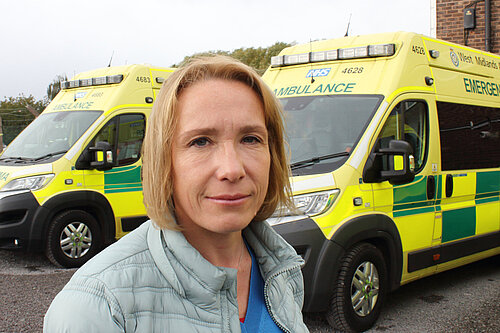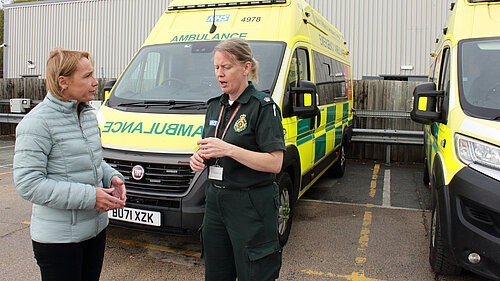
Helen Morgan responds to new Shropshire ambulance data
MP and health campaigner Helen Morgan has said she remains ‘worried sick’ about emergency care in Shropshire but is relieved that some progress has been made.

Shocking figures have unveiled the local areas in England with the longest ambulance delays, revealing a stark “postcode lottery” for response times to life-threatening calls.
Potential heart attack and stroke victims in the worst-hit parts of the West Midlands are waiting an average of 49 minutes for paramedics to arrive.
The figures, uncovered by the Liberal Democrats through Freedom of Information requests, reveal how patients whose lives are in immediate danger are waiting twice as long in some rural parts of the region than urban ones.
In Shropshire and Telford, patients waited an average of 11 minutes and 31 seconds for Category 1 calls, compared to 6 minutes and 20 seconds in the Black Country.
This postcode lottery is a pattern repeated across England, with patients in Mid Devon waiting 15 minutes and 20 seconds for Category 1 calls, the longest in the country, compared to 5 minutes and 48 seconds in Hammersmith.
Figures were provided by all ten ambulance trusts in England, revealing local figures on response times that aren’t published in the regular region-wide data. The research covers 227 local areas in England, showing the worsening picture across the country.
Of these, all but two are failing to reach the 18-minute target for Category 2 calls which can include heart attack and stroke victims, while 83% of areas missed the 7 minute target for the most serious Category 1 calls. Not one area in England achieved the target for both Category 1 and 2 calls.
In 32 local areas, average waits for Category 2 calls which can include heart attack or stroke victims have more than doubled in the past two years. In Cornwall, the average Category 2 wait has more than tripled to one hour and 41 minutes, up from 32 minutes two years ago.
The Liberal Democrats are calling for an urgent five point plan to support ambulance services this winter. As part of this the party is calling for a long-term strategy to improve social care, free up hospital beds and stop ambulances waiting outside hospitals.
Helen Morgan, Liberal Democrat MP for North Shropshire, said, “These heart-breaking figures show that all across the West Midlands and the country, targets are being missed and patients are being left waiting far too long for an ambulance to arrive.
“This stark postcode lottery means that if you suffer a heart attack or stroke, your chances of getting to hospital on time depend on where you happen to live. If you live in Birmingham or the surrounding area you will get help much faster than in Shropshire.
“Three years ago, an ambulance taking 50 minutes to reach a stroke patient would have been a national scandal. The failures of this Conservative Government mean it is now the norm.
“Every day we hear more and more devastating stories of pensioners left stranded for hours, or families watching a loved one die before a paramedic could reach them. Our overstretched local NHS services are collapsing under the strain of years of neglect under this Conservative government.
“Ministers must bring forward extra support to get ambulance services through winter as well as a long-term strategy to ensure people can get emergency care when they need it. That means addressing workforce shortages, fixing the social care crisis and ending the shortage of hospital beds, all of which are leaving patients in ambulances stuck outside A&E for hours.”